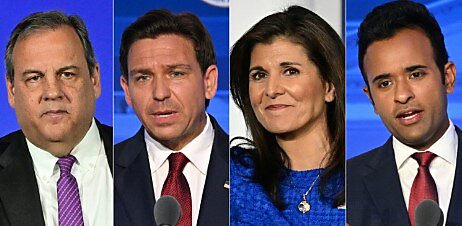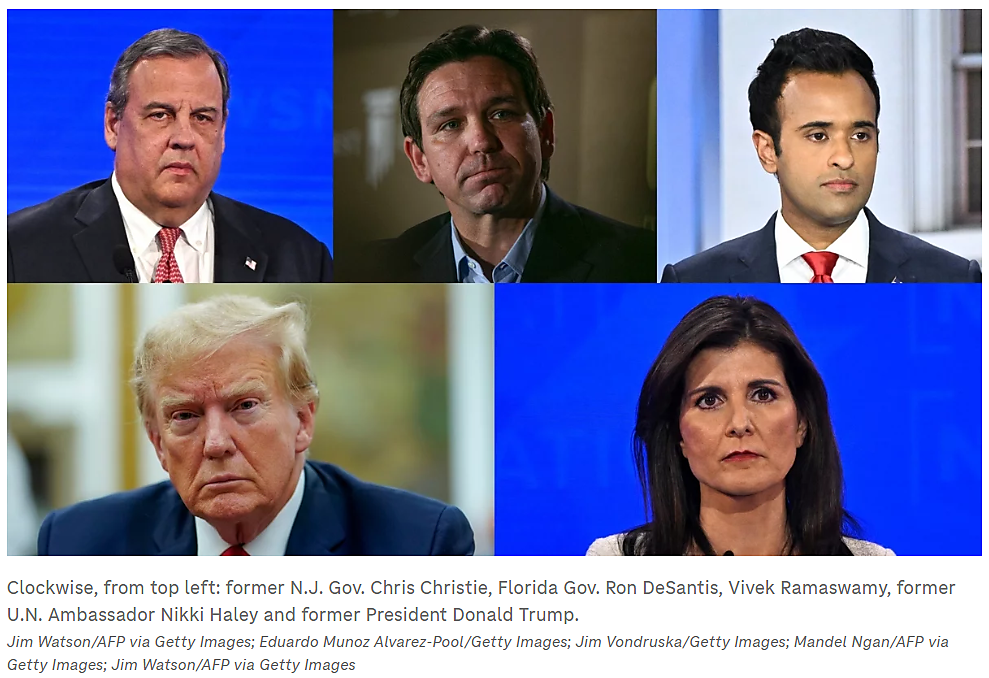
The most important challenge for the next president will be tackling the government’s massive and growing debt. Federal debt held by the public of $26 trillion amounts to $200,000 for every household in the nation. Compared to the size of the economy, the debt will soon reach levels never seen in our nation’s history.
Rising government debt is undermining economic growth and may trigger a financial crisis. We desperately need to cut the budget, yet both leading presidential candidates—Joe Biden and Donald Trump—embraced large‐scale deficit‐spending during their tenures in the White House.
Do any presidential candidates offer hope of fiscal sanity? Let’s see what the Republicans are saying.
Donald Trump
- Social Security. Trump suggests not cutting a “single penny” from Social Security and has criticized Nikki Haley’s proposal to raise the program’s retirement age. He proposes using oil and gas leasing revenues to keep the program afloat rather than spending restraint.
- Medicare. Trump opposes Medicare cuts and has criticized Ron DeSantis for supporting congressional proposals to reform the program.
- Ukraine. Trump is skeptical of aid to Ukraine and promises to deliver a quick peace deal with Russia.
- Education. Trump proposes closing down the federal Department of Education, but he also suggests new ways for the federal government to meddle in the schools.
- Impoundment. Trump says that he will revive the presidential impoundment power to “squeeze the bloated federal bureaucracy for massive savings.”
- Federal Workers. In late 2020, Trump issued an executive order that would have turned some federal workers into “Schedule F” employees to make firing easier. Trump would revive the order if re‐elected.
- Other Cuts. Trump has called for cuts to “corrupt foreign countries,” “climate extremism,” “left‐wing gender programs from our military,” and “waste, fraud and abuse everywhere we can find it.”
Ron DeSantis
- Social Security. DeSantis said, “We’re not going to mess with Social Security as Republicans,” but he has also expressed support for making program reforms for younger workers.
- Medicare. When he was running for Congress, DeSantis supported turning Medicare into a premium support program, which would increase competition and choice.
- Ukraine. DeSantis is skeptical about Ukraine aid, arguing that aiding Israel is a higher priority.
- Federal Agencies. DeSantis proposes to eliminate the Internal Revenue Service, Department of Commerce, Department of Energy, and Department of Education. To tackle the deep state, he will “start slitting throats on Day 1.”
- Debt. DeSantis, Haley, and Christie have criticized Trump for adding trillions to the government’s debt load.
Nikki Haley
- Social Security. Haley wants to raise the retirement age for younger people, adjust inflation indexing of benefits, and limit benefits for the wealthy. She said, “It is unrealistic to say you’re not going to touch entitlements” and “entitlement spending is unsustainable. We need reform.”
- Medicare. Haley wants to reform Medicare by expanding privately provided plans in order to increase competition and reduce prices.
- Ukraine. Haley supports maintaining Ukraine aid in the belief that defeating Russia would help secure future peace.
- Spending Caps. Haley wants to reduce discretionary spending to 2019 levels and limit overall federal spending to a percentage of gross domestic product.
- Federalism. Her plan would “push federal programs down to the states. Instead of the federal government deciding where and how tax money is spent, use block grants to give states the freedom to decide the best way to use federal funds.”
- Zero‐Based Budgeting. Haley wants program budgets justified annually, rather than being based on prior spending levels.
- Energy Subsidies. Haley would eliminate Biden’s massive green subsidies passed in the Inflation Reduction Act, which would save more than $500 billion over a decade.
- Debt. Haley focused on debt and deficits the most during the four presidential primary debates.
Vivek Ramaswamy
- Social Security and Medicare. Ramaswamy says that he will not cut Social Security and Medicare benefits for seniors. Instead, he says that economic growth will make the programs solvent, which is unrealistic.
- Zero‐Based Budgeting. Ramaswamy said, “Here’s how we fix the debt crisis: zero‐base budgeting. Start from zero for every department and ask what (if any) spending is required instead of just taking last year’s budget as the default.”
- Ukraine. Ramaswamy opposes aid for Ukraine.
- Federal Agencies. Ramaswamy proposes shutting down the Department of Education, the FBI, the IRS, and other agencies.
- Defense. Ramaswamy wants to increase defense spending to 4 percent of GDP from 3 percent today. That would cost $4.3 trillion over the next ten years.
- Federal Workforce. Ramaswamy wants to lay off 1 million federal workers to cut the federal workforce in half. He also wants to move most federal agencies out of DC, end remote work for federal employees, and end federal workforce unionization.
Chris Christie
- Social Security. Christie would raise the retirement age for younger workers and reduce benefits for the wealthy.
- Medicare. Christie has called federal policymakers “liars and cowards” for not tackling Medicare and Social Security reforms.
- Medicaid. Christie proposes turning Medicaid into a block grant, which would allow federal policymakers to restrain spending and reduce regulations imposed on the states.
- Ukraine. Christie strongly supports aid to Ukraine, calling it the “price we pay for being the leaders of the free world.”
- Inflation Reduction Act. Christie has called the IRA a “mistake.”
All in all, Republican presidential candidates are proposing modest spending cuts. Some suggestions to cut “waste” are just bluster. Some proposals, such as zero‐based budgeting, don’t mean very much. And some proposals don’t carry weight without a concrete plan. For example, scrapping the IRS is a good goal, but it needs to be combined with a plan for major tax‐code simplification.
That said, the candidates are on the right track in proposing shutdowns of agencies that subsidize state and local governments. Defunding the federal Department of Education is a fantastic reform goal that GOP presidential candidates should push hard. The candidates should also push cuts to other state‐local subsidies, such as those for housing, welfare, and urban transit. Some candidates want spending increases on defense and foreign aid, and the onus should be on them to propose full offsets elsewhere in the budget.
When the next president enters office in 2025, the federal government will be raising $5.0 trillion in taxes but spending $6.6 trillion, or 32 percent more. That level of imbalance is outrageous. All presidential candidates of both parties should propose detailed plans to tackle the government’s massive flood of red ink.

Some spending cut ideas for the candidates are here, here, here, here, and here.
Themes: